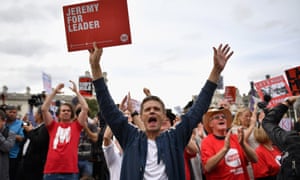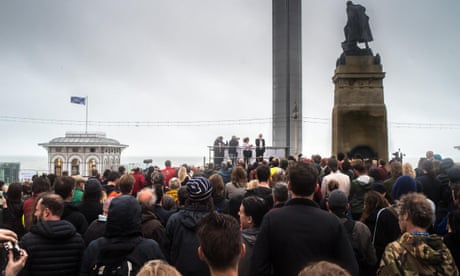
‘Members of Momentum feel as though the Labour coup is as much an attack on their right to participate in public discourse as it is on Jeremy Corbyn.’ Photograph: Jeff J Mitchell/Getty Images
Lock up your children, for there is a sinister force taking root in modern Britain. It is a cult, with followers like those of mass murderer Charles Manson, shrouded in a cloud of spite and acrimony. The worst thing about this terrifying insurgency? My mum is part of it.
Lock up your children, for there is a sinister force taking root in modern Britain. It is a cult, with followers like those of mass murderer Charles Manson, shrouded in a cloud of spite and acrimony. The worst thing about this terrifying insurgency? My mum is part of it.

'We're not cult members': Labour supporters at Corbyn rallies
I am, of course, talking about the people who support Jeremy Corbyn – 12,000 of whom have joined Momentum, the activist movement that propelled Corbyn to power. And after Monday’s high court win and a clean sweep in the elections to Labour’s national executive committee, support for Corbyn shows no signs of abating – despite continued suggestions that those supporters are nothing more than an abusive rabble. How many of the journalists writing panicked screeds about these awful people have actually met any of them, do you think? I ask because writing about the Corbyn phenomenon over the last year means I’ve met probably hundreds of his supporters and to be honest, I find dealing with them the most pleasant element of writing about Corbyn.
A couple of months ago, I went to a political event that included a branch of Momentum. All young women; they were energetic, funny and very friendly. Two weeks ago, I had a debate with a Momentum member about Corbyn’s media strategy. Of the two of us, it was me who was the ruder, more impatient one. When Corbyn ran for leadership last year, I visited phone banks for him dozens of times, and spent hours in the company of the very people who went on to found Momentum. I told myself I was researching a piece; actually I think I just liked talking to them.
Sure, my experiences of these Corbyn supporters might not be representative. But they do suggest that the depiction of them as a madcap bunch of deluded cultists is not representative either. Broadly speaking, the media has failed to understand the political moment in the Labour party; it has shown a damning lack of interest in the fact that people who had previously written off party politics are now flocking towards it in their hundreds of thousands – preferring instead to dismiss them as an angry mob.
One half of that description is accurate, however. Corbyn supporters may not be a mob, but they are angry. And to understand why, it is useful to consider the words of the academic Jeremy Gilbert, a longstanding Labour member and activist who has joined Momentum: “Momentum is simply trying to give a voice to a body of opinion which has been widespread throughout the country for many years, but has been denied any kind of place in our public life since the early days of New Labour. It is a body of opinion which believes, with good reason, that the embrace of neoliberal economics and neoconservative foreign policy under Blair was a disaster … Naturally some of those voices, suppressed for so long, sound raucous, aggressive and uncouth.”
The anger that commentators detect in the Corbyn movement, in my experience, is not a symptom of the fact that it has been infiltrated by bullies – but that its members feel as though the Labour coup is as much an attack on their right to participate in public discourse as it is on Corbyn.
Everything the left traditionally stands for – from human rights and socialism to a foreign policy driven by diplomacy – has been, at best, marginalised and, at worst, actively mocked in mainstream political discourse since the 1970s. And nowhere is this more apparent than in the depiction of the trade unions, the last bastions of organised British socialism, as insidious barons intent on wrecking British life (a claim that sounds particularly ludicrous when made by newspapers who supported the Conservatives at the last election – a party consisting of members of the actual landed gentry).
I am yet to meet a single Corbynite who is naive about Corbyn’s failings as a leader, the great challenges he faces, or who does not want to win a general election. But the reason so many have coalesced around him anyway is because they view his leadership as the only opportunity they have had in at least 30 years to see their views finally represented in public life. The Labour rebels’ attempt to unseat him is, in their minds, as much an attempt to excommunicate the wider left as it is to get rid of Corbyn himself. Perhaps the most salient evidence of this is the decision to charge affiliate members £25 to vote in the leadership election, and ban outright members who joined fewer than six months ago – a decision that has now been overturned in court.
Worse still for Corbyn supporters, the policy positions they have taken over the last 30 years have often been proven right. Lack of social housing has led to a spiralling housing crisis; the deregulation of the financial industry would have caused economic collapse had it not been for state intervention; queasiness around public ownership has caused escalating transport costs and arguably the shambles that is Southern Railway; inequality is the UK’s most pressing social issue; a reluctance to rein in fossil fuel companies has led to a climate emergency; and even Tony Blair accepts that the Iraq war may have led to the rise of Isis. This is why so many Corbyn supporters are upset by the coup, and why they have decided to back him unequivocally, in spite of the incompetence that has at times been part of his leadership.
I have a lot of sympathy with Owen Smith supporters who are horrified by Labour’s poll ratings. But I have zero sympathy with those in the party who have been utterly unwilling to engage with Corbyn supporters, and who have not reflected on why they lost control of their party to someone they so clearly regard as useless. There are simply not enough delusional Leninists in Britain to make up the entirety of Corbyn’s support – these are ordinary British voters who want radical solutions to a growing number of crises. And until they are listened to and taken seriously, Corbyn and the movement keeping him in power is not going anywhere.
No comments:
Post a Comment